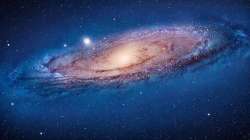Barrier separating centre of Milky Way from cosmic ray sea discovered
The team investigated a map of radioactive gamma-rays -- the highest-energy form of light in the universe, which can arise when extremely high-speed particles called cosmic rays crash into ordinary matter -- blasting in and around the center of our galaxy.

A team of astronomers from the Chinese Academy of Sciences in Nanjing have now discovered an enormous 'barrier' separating the center of the Milky Way from the cosmic ray sea, Space.com reported.
The team investigated a map of radioactive gamma-rays -- the highest-energy form of light in the universe, which can arise when extremely high-speed particles called cosmic rays crash into ordinary matter -- blasting in and around the center of our galaxy.
The map revealed that something near the center of the galaxy appears to be accelerating particles to mind-blowing speeds -- very near the speed of light -- and creating an abundance of cosmic rays and gamma-rays just outside the galactic center.
However, even as the galactic center blows a constant storm of high-energy radiation into space, something near the Milky Way's core prevents a large portion of cosmic rays from other parts of the universe from entering, the team reported in the journal Nature Communications.
The researchers described the effect as an invisible "barrier" that is wrapped around the galactic center and is keeping the density of cosmic rays there significantly lower than the baseline level seen throughout the rest of our galaxy.
In other words: Cosmic rays can get out of the galactic center but have a hard time getting in.
How this cosmic barrier works, or why it exists, remains a mystery, the researchers said.
In their new study, they compared the density of cosmic rays in this sea to the density of cosmic rays within the galactic center. Cosmic rays cannot be seen directly, but scientists can find them in gamma-ray maps of space, which effectively show where cosmic rays have collided with other types of matter.
Using data from the Fermi Large Area Telescope, the team confirmed that something in the galactic center is indeed acting as a giant particle accelerator, shooting cosmic rays out into the galaxy, the report said.
Also Read | NASA finds first signs of planet outside Milky Way galaxy